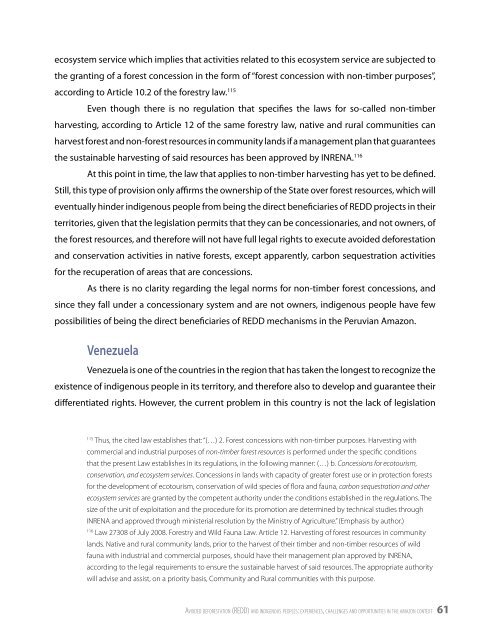Avoided Deforestation (REDD) and Indigenous ... - Amazon Fund
Avoided Deforestation (REDD) and Indigenous ... - Amazon Fund
Avoided Deforestation (REDD) and Indigenous ... - Amazon Fund
You also want an ePaper? Increase the reach of your titles
YUMPU automatically turns print PDFs into web optimized ePapers that Google loves.
ecosystem service which implies that activities related to this ecosystem service are subjected to<br />
the granting of a forest concession in the form of “forest concession with non-timber purposes”,<br />
according to Article 10.2 of the forestry law. 115<br />
Even though there is no regulation that specifies the laws for so-called non-timber<br />
harvesting, according to Article 12 of the same forestry law, native <strong>and</strong> rural communities can<br />
harvest forest <strong>and</strong> non-forest resources in community l<strong>and</strong>s if a management plan that guarantees<br />
the sustainable harvesting of said resources has been approved by INRENA. 116<br />
At this point in time, the law that applies to non-timber harvesting has yet to be defined.<br />
Still, this type of provision only affirms the ownership of the State over forest resources, which will<br />
eventually hinder indigenous people from being the direct beneficiaries of <strong>REDD</strong> projects in their<br />
territories, given that the legislation permits that they can be concessionaries, <strong>and</strong> not owners, of<br />
the forest resources, <strong>and</strong> therefore will not have full legal rights to execute avoided deforestation<br />
<strong>and</strong> conservation activities in native forests, except apparently, carbon sequestration activities<br />
for the recuperation of areas that are concessions.<br />
As there is no clarity regarding the legal norms for non-timber forest concessions, <strong>and</strong><br />
since they fall under a concessionary system <strong>and</strong> are not owners, indigenous people have few<br />
possibilities of being the direct beneficiaries of <strong>REDD</strong> mechanisms in the Peruvian <strong>Amazon</strong>.<br />
Venezuela<br />
Venezuela is one of the countries in the region that has taken the longest to recognize the<br />
existence of indigenous people in its territory, <strong>and</strong> therefore also to develop <strong>and</strong> guarantee their<br />
differentiated rights. However, the current problem in this country is not the lack of legislation<br />
115 Thus, the cited law establishes that: “(…) 2. Forest concessions with non-timber purposes. Harvesting with<br />
commercial <strong>and</strong> industrial purposes of non-timber forest resources is performed under the specific conditions<br />
that the present Law establishes in its regulations, in the following manner: (…) b. Concessions for ecotourism,<br />
conservation, <strong>and</strong> ecosystem services. Concessions in l<strong>and</strong>s with capacity of greater forest use or in protection forests<br />
for the development of ecotourism, conservation of wild species of flora <strong>and</strong> fauna, carbon sequestration <strong>and</strong> other<br />
ecosystem services are granted by the competent authority under the conditions established in the regulations. The<br />
size of the unit of exploitation <strong>and</strong> the procedure for its promotion are determined by technical studies through<br />
INRENA <strong>and</strong> approved through ministerial resolution by the Ministry of Agriculture.” (Emphasis by author.)<br />
116 Law 27308 of July 2008. Forestry <strong>and</strong> Wild Fauna Law. Article 12. Harvesting of forest resources in community<br />
l<strong>and</strong>s. Native <strong>and</strong> rural community l<strong>and</strong>s, prior to the harvest of their timber <strong>and</strong> non-timber resources of wild<br />
fauna with industrial <strong>and</strong> commercial purposes, should have their management plan approved by INRENA,<br />
according to the legal requirements to ensure the sustainable harvest of said resources. The appropriate authority<br />
will advise <strong>and</strong> assist, on a priority basis, Community <strong>and</strong> Rural communities with this purpose.<br />
Av o i d e d d e f o re s t A t i o n (redd) A n d i n d i g e n o u s p e o p l e s: experiences, chAllenges A n d o p p o r t u n i t i e s in t h e A m A zo n c o n t e x t 61
















